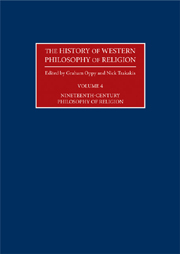Book contents
- Frontmatter
- Contents
- Editorial Introduction
- Contributors
- 1 Nineteenth-Century Philosophy of Religion: An Introduction
- 2 Johann Gottlieb Fichte
- 3 Friedrich Schleiermacher
- 4 G. W. F. Hegel
- 5 Friedrich Schelling
- 6 Arthur Schopenhauer
- 7 Auguste Comte
- 8 John Henry Newman
- 9 Ralph Waldo Emerson
- 10 Ludwig Feuerbach
- 11 John Stuart Mill
- 12 Charles Darwin
- 13 Søren Kierkegaard
- 14 Karl Marx and Friedrich Engels
- 15 Wilhelm Dilthey
- 16 Edward Caird
- 17 Charles S. Peirce
- 18 Friedrich Nietzsche
- 19 Josiah Royce
- 20 Sigmund Freud
- 21 Émile Durkheim
- Chronology
- Bibliography
- Index
17 - Charles S. Peirce
- Frontmatter
- Contents
- Editorial Introduction
- Contributors
- 1 Nineteenth-Century Philosophy of Religion: An Introduction
- 2 Johann Gottlieb Fichte
- 3 Friedrich Schleiermacher
- 4 G. W. F. Hegel
- 5 Friedrich Schelling
- 6 Arthur Schopenhauer
- 7 Auguste Comte
- 8 John Henry Newman
- 9 Ralph Waldo Emerson
- 10 Ludwig Feuerbach
- 11 John Stuart Mill
- 12 Charles Darwin
- 13 Søren Kierkegaard
- 14 Karl Marx and Friedrich Engels
- 15 Wilhelm Dilthey
- 16 Edward Caird
- 17 Charles S. Peirce
- 18 Friedrich Nietzsche
- 19 Josiah Royce
- 20 Sigmund Freud
- 21 Émile Durkheim
- Chronology
- Bibliography
- Index
Summary
Charles S. Peirce, co-founder with William James of the American pragmatist tradition, was born in Cambridge, Massachusetts, in 1839 to Benjamin Peirce and Sarah Mills Peirce. Benjamin was a noted Harvard mathematician who also harboured a quiet affinity for experientialist religion such as that of Immanuel Swedenborg. This affinity had a lingering influence on his son's thought. Charles was raised in the cultural milieu of the Unitarian response to New England Calvinism and in his early adult life joined the Episcopal Church of America. He was also thoroughly involved with the science of his day, working in both chemistry and astronomy; this meant that, as a scientist and philosopher, Peirce was also directly involved in the dissemination of evolutionary theory. Peirce's academic career was marked by a series of difficulties. Harvard President Charles Eliot, a childhood acquaintance of Peirce, successfully prevented him from obtaining any full-time position at Harvard. He taught for four years in Johns Hopkins' developing graduate programme but was released for unspecified ‘moral’ reasons in 1883. Peirce also conducted gravitational research for the US Coast Survey for many years but was released from service in 1891 when the organization was overhauled. He spent the rest of his life in relative poverty and obscurity, living with his second wife, Juliette, at their home in Milford, Pennsylvania. He died there in 1914.
- Type
- Chapter
- Information
- The History of Western Philosophy of Religion , pp. 221 - 230Publisher: Acumen PublishingPrint publication year: 2009



